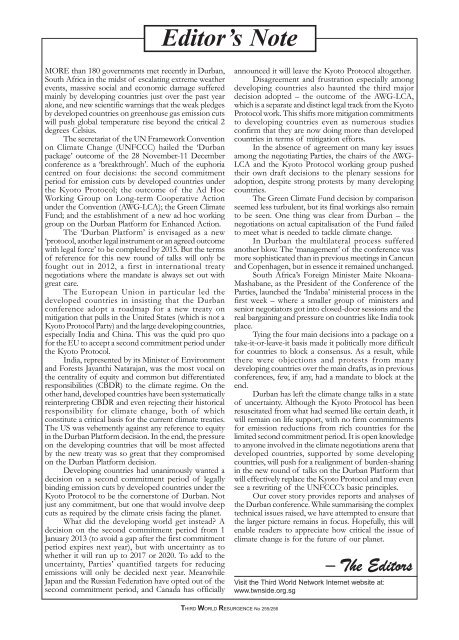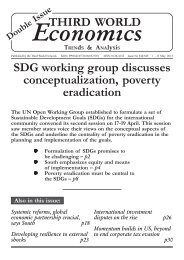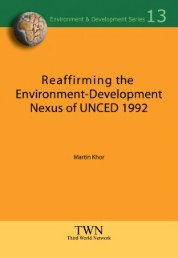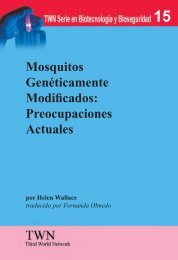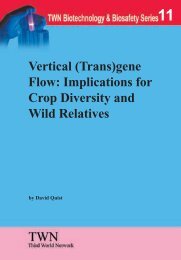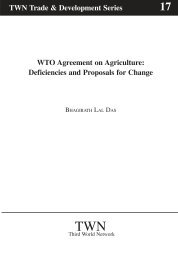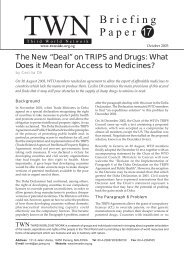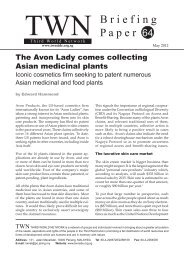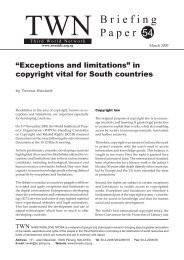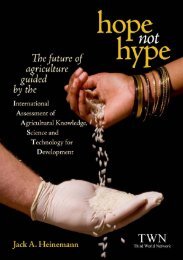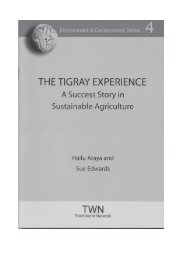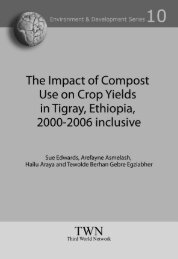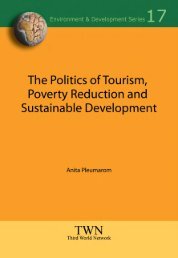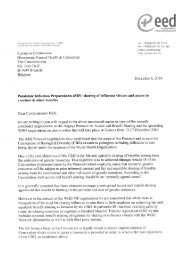Download - Third World Network
Download - Third World Network
Download - Third World Network
Create successful ePaper yourself
Turn your PDF publications into a flip-book with our unique Google optimized e-Paper software.
Editor’s Note<br />
MORE than 180 governments met recently in Durban,<br />
South Africa in the midst of escalating extreme weather<br />
events, massive social and economic damage suffered<br />
mainly by developing countries just over the past year<br />
alone, and new scientific warnings that the weak pledges<br />
by developed countries on greenhouse gas emission cuts<br />
will push global temperature rise beyond the critical 2<br />
degrees Celsius.<br />
The secretariat of the UN Framework Convention<br />
on Climate Change (UNFCCC) hailed the ‘Durban<br />
package’ outcome of the 28 November-11 December<br />
conference as a ‘breakthrough’. Much of the euphoria<br />
centred on four decisions: the second commitment<br />
period for emission cuts by developed countries under<br />
the Kyoto Protocol; the outcome of the Ad Hoc<br />
Working Group on Long-term Cooperative Action<br />
under the Convention (AWG-LCA); the Green Climate<br />
Fund; and the establishment of a new ad hoc working<br />
group on the Durban Platform for Enhanced Action.<br />
The ‘Durban Platform’ is envisaged as a new<br />
‘protocol, another legal instrument or an agreed outcome<br />
with legal force’ to be completed by 2015. But the terms<br />
of reference for this new round of talks will only be<br />
fought out in 2012, a first in international treaty<br />
negotiations where the mandate is always set out with<br />
great care.<br />
The European Union in particular led the<br />
developed countries in insisting that the Durban<br />
conference adopt a roadmap for a new treaty on<br />
mitigation that pulls in the United States (which is not a<br />
Kyoto Protocol Party) and the large developing countries,<br />
especially India and China. This was the quid pro quo<br />
for the EU to accept a second commitment period under<br />
the Kyoto Protocol.<br />
India, represented by its Minister of Environment<br />
and Forests Jayanthi Natarajan, was the most vocal on<br />
the centrality of equity and common but differentiated<br />
responsibilities (CBDR) to the climate regime. On the<br />
other hand, developed countries have been systematically<br />
reinterpreting CBDR and even rejecting their historical<br />
responsibility for climate change, both of which<br />
constitute a critical basis for the current climate treaties.<br />
The US was vehemently against any reference to equity<br />
in the Durban Platform decision. In the end, the pressure<br />
on the developing countries that will be most affected<br />
by the new treaty was so great that they compromised<br />
on the Durban Platform decision.<br />
Developing countries had unanimously wanted a<br />
decision on a second commitment period of legally<br />
binding emission cuts by developed countries under the<br />
Kyoto Protocol to be the cornerstone of Durban. Not<br />
just any commitment, but one that would involve deep<br />
cuts as required by the climate crisis facing the planet.<br />
What did the developing world get instead? A<br />
decision on the second commitment period from 1<br />
January 2013 (to avoid a gap after the first commitment<br />
period expires next year), but with uncertainty as to<br />
whether it will run up to 2017 or 2020. To add to the<br />
uncertainty, Parties’ quantified targets for reducing<br />
emissions will only be decided next year. Meanwhile<br />
Japan and the Russian Federation have opted out of the<br />
second commitment period, and Canada has officially<br />
announced it will leave the Kyoto Protocol altogether.<br />
Disagreement and frustration especially among<br />
developing countries also haunted the third major<br />
decision adopted – the outcome of the AWG-LCA,<br />
which is a separate and distinct legal track from the Kyoto<br />
Protocol work. This shifts more mitigation commitments<br />
to developing countries even as numerous studies<br />
confirm that they are now doing more than developed<br />
countries in terms of mitigation efforts.<br />
In the absence of agreement on many key issues<br />
among the negotiating Parties, the chairs of the AWG-<br />
LCA and the Kyoto Protocol working group pushed<br />
their own draft decisions to the plenary sessions for<br />
adoption, despite strong protests by many developing<br />
countries.<br />
The Green Climate Fund decision by comparison<br />
seemed less turbulent, but its final workings also remain<br />
to be seen. One thing was clear from Durban – the<br />
negotiations on actual capitalisation of the Fund failed<br />
to meet what is needed to tackle climate change.<br />
In Durban the multilateral process suffered<br />
another blow. The ‘management’ of the conference was<br />
more sophisticated than in previous meetings in Cancun<br />
and Copenhagen, but in essence it remained unchanged.<br />
South Africa’s Foreign Minister Maite Nkoana-<br />
Mashabane, as the President of the Conference of the<br />
Parties, launched the ‘Indaba’ ministerial process in the<br />
first week – where a smaller group of ministers and<br />
senior negotiators got into closed-door sessions and the<br />
real bargaining and pressure on countries like India took<br />
place.<br />
Tying the four main decisions into a package on a<br />
take-it-or-leave-it basis made it politically more difficult<br />
for countries to block a consensus. As a result, while<br />
there were objections and protests from many<br />
developing countries over the main drafts, as in previous<br />
conferences, few, if any, had a mandate to block at the<br />
end.<br />
Durban has left the climate change talks in a state<br />
of uncertainty. Although the Kyoto Protocol has been<br />
resuscitated from what had seemed like certain death, it<br />
will remain on life support, with no firm commitments<br />
for emission reductions from rich countries for the<br />
limited second commitment period. It is open knowledge<br />
to anyone involved in the climate negotiations arena that<br />
developed countries, supported by some developing<br />
countries, will push for a realignment of burden-sharing<br />
in the new round of talks on the Durban Platform that<br />
will effectively replace the Kyoto Protocol and may even<br />
see a rewriting of the UNFCCC’s basic principles.<br />
Our cover story provides reports and analyses of<br />
the Durban conference. While summarising the complex<br />
technical issues raised, we have attempted to ensure that<br />
the larger picture remains in focus. Hopefully, this will<br />
enable readers to appreciate how critical the issue of<br />
climate change is for the future of our planet.<br />
– The Editors<br />
Visit the <strong>Third</strong> <strong>World</strong> <strong>Network</strong> Internet website at:<br />
www.twnside.org.sg<br />
THIRD WORLD RESURGENCE No 255/256


